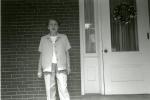Whitfield Jenks Bell, Jr., (3 December, 1914-2 January, 2009) was born in Newburgh, New York, and grew up in suburban Philadelphia.1 After graduating from Lower Merion High School, he enrolled in Dickinson College, graduating in the class of 1935. The next year he began studies at the Dickinson School of Law, but he did not complete his law degree, discovering instead a greater interest in history.
In 1937 he was initiated into the Cumberland Star Lodge of Carlisle, and as a Freemason he achieved the status of Master Mason. In 1950, to mark the lodge’s 150th anniversary, Bell wrote a history of its founding. From 1990 to 2003 he served on the Committee on Library and Museum for the Grand Lodge of Philadelphia.2
After leaving law school, he entered a master’s degree program in history at the University of Pennsylvania, but service in the Second World War delayed pursuit of a Ph.D. After the war he returned to the University of Pennsylvania, earning a doctorate in history in 1947. He had become fascinated by eighteenth-century history, a subject occupying him for the rest of his life. In his eighties, by way of explaining his limited concern for recent events, he told a young historian, “I live in the eighteenth century.”
It was a facetious observation, typically self-deprecating. Still, it conveyed his intellectual interest as well as his demeanor. Bell was a quiet, methodical man, wearing easily an old-fashioned politeness. He spoke in complete sentences, even paragraphs, yet his impeccable manners and gentle humor never kept him from a clear, direct statement.
When the United States entered World War II, Bell sought to enlist in the Army and then the Navy, but both services rejected him for poor eyesight. Undeterred, he joined the American Field Service, being assigned to the British Eighth Army of Bernard Law Montgomery. Unlike most Americans, he always spoke highly of Montgomery. Bell drove an ambulance in North Africa, Italy, and Germany, and he helped to liberate the concentration camp of Bergen-Belsen. In his nineties, he told a younger historian, “It’s the only part of the war I still have nightmares about.”
From 1945 to 1955 Bell taught American history at Dickinson College. In 1950 he was appointed the first Boyd Lee Spahr Professor of American History at Dickinson, and also in 1950 he edited the first volume of Spahr Lectures, Bulwark of Liberty. A former student recalled Bell’s “probing mind, his facility to inspire and teach his students, and to make us think beyond the facts of history—to take a rather dry subject and make it a rich, living, and dynamic force.”3
In 1953 and 1954, he worked as visiting editor of William and Mary Quarterly in Williamsburg, Virginia, a year that opened a new chapter in Bell’s life. “I found,” he later said, “that I could be happy somewhere other than Dickinson.” As a result, he resigned his post at Dickinson and accepted a position with Yale, as an associate editor of the collected papers of Benjamin Franklin.
On that project Yale collaborated with the American Philosophical Society, and in 1960 Bell became associate librarian of that Society. In 1966 he became the Society’s librarian and then, in 1977, its executive officer. In 1983 he retired, and from 1984 to 1991 he held the position of curator. All the while, he continued his own research, publishing more than two hundred articles, chapters, book reviews, and encyclopedia entries, as well as more than a half dozen books.
He maintained two residences, one in Philadelphia, the other in Carlisle. He would spend the weekends in Carlisle, taking the train from Philadelphia to Harrisburg, then the bus to Carlisle. 4 In Carlisle he served from 1995 to 2002 as editor of the Cumberland County Historical Society’s journal, Cumberland County History. As editor he applied his meticulous standard of scholarship and encouraged younger historians, giving them advice on how to improve their historical method and writing style. His emphasis was on clarity, elegance, and the ability, if need be, to document every sentence.
During this time, he kept an office at the American Philosophical Society. Between 1997 and 2009 he wrote for the Society Patriot-Improvers, a three-volume biographical encyclopedia of the Society’s members in the colonial era. 5 Bell said that he was pleased that he managed to write about those artisans, lawyers, and merchants without using the word “elite.”
In 1991 and then between 2002 and 2004, Bell gave nine interviews to Michael J. Birkner, a professor of history at Gettysburg College. 6 Collected in book form, they serve as Bell’s memoirs. In 2005 Bell moved to the Sarah A. Todd Memorial Home in Carlisle, where he died after a brief bout with diabetes. There were memorial services at Dickinson College and the American Philosophical Society.

